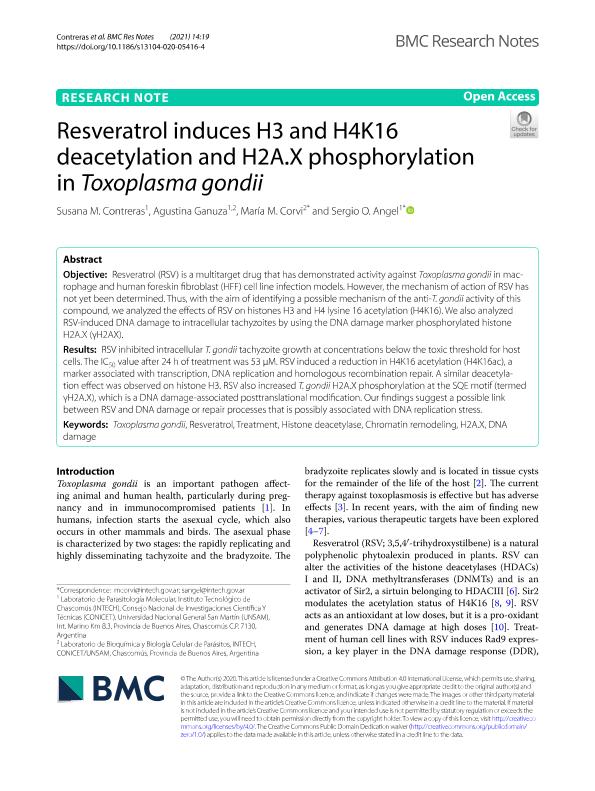Artículo
Resveratrol induces H3 and H4K16 deacetylation and H2A.X phosphorylation in Toxoplasma gondii
Fecha de publicación:
12/2021
Editorial:
BioMed Central
Revista:
BMC Research Notes
e-ISSN:
1756-0500
Idioma:
Inglés
Tipo de recurso:
Artículo publicado
Clasificación temática:
Resumen
Objective: Resveratrol (RSV) is a multitarget drug that has demonstrated activity against Toxoplasma gondii in macrophage and human foreskin fbroblast (HFF) cell line infection models. However, the mechanism of action of RSV has not yet been determined. Thus, with the aim of identifying a possible mechanism of the anti-T. gondii activity of this compound, we analyzed the efects of RSV on histones H3 and H4 lysine 16 acetylation (H4K16). We also analyzed RSV-induced DNA damage to intracellular tachyzoites by using the DNA damage marker phosphorylated histone H2A.X (γH2AX). Results: RSV inhibited intracellular T. gondii tachyzoite growth at concentrations below the toxic threshold for host cells. The IC50 value after 24 h of treatment was 53 μM. RSV induced a reduction in H4K16 acetylation (H4K16ac), a marker associated with transcription, DNA replication and homologous recombination repair. A similar deacetylation efect was observed on histone H3. RSV also increased T. gondii H2A.X phosphorylation at the SQE motif (termed γH2A.X), which is a DNA damage-associated posttranslational modifcation. Our fndings suggest a possible link between RSV and DNA damage or repair processes that is possibly associated with DNA replication stress.
Archivos asociados
Licencia
Identificadores
Colecciones
Articulos(CCT - LA PLATA)
Articulos de CTRO.CIENTIFICO TECNOL.CONICET - LA PLATA
Articulos de CTRO.CIENTIFICO TECNOL.CONICET - LA PLATA
Citación
Contreras, Susana Marisol; Ganuza, Agustina; Corvi, Maria Martha; Angel, Sergio Oscar; Resveratrol induces H3 and H4K16 deacetylation and H2A.X phosphorylation in Toxoplasma gondii; BioMed Central; BMC Research Notes; 14; 1; 12-2021; 19-26
Compartir
Altmétricas




